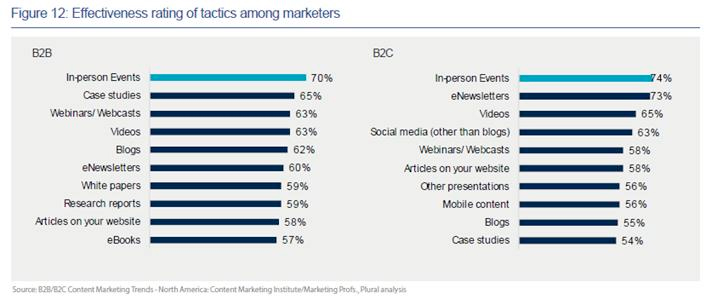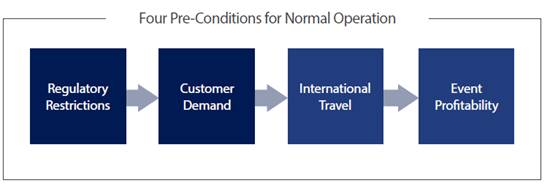- In-person events remain the most effective channel for B2B marketers
- COVID-19 is set to accelerate change in the events business model as organisers strengthen digital channels and year-round engagement
- For resilient business models the fundamental drivers of M&A activity and private equity investment will remain
A review of the B2B live events sector released today by Arrowpoint Advisory, the dedicated lower mid-market team of Rothschild & Co in the UK, and Plural Strategy, the leading strategy consultancy to the events, media and information industries, reveals that listed event operators are, on average, trading at a 40% discount to valuations at the start of January 2020 as a direct result of COVID-19.
Listed event operators fall into two categories: companies for whom live events comprises the majority of revenue, and diversified media groups for whom live events are a smaller part of their business. Diversified media groups have traded in line with the market, declining 23% on average, whilst event focussed groups have seen valuations reduced by an average of 53%.

Marketers continue to value in-person B2B events, believing that they remain the most effective channel of all marketing options.


However, as the world slowly moves out of lockdown, B2B live event organisers face four hurdles to re-starting events: regulatory restrictions on events, customer demand, restrictions on international travel, and event profitability in the context of social distancing restrictions. Of these, ongoing travel restrictions and profitability of the event model under social distancing requirements are expected to be the most significant barriers to the industry ramping up. When asked when they expected live events to return, 62% of event organisers believe they will resume in some fashion by the autumn.
Jonny Baynes, Partner at Plural Strategy, commented: “Even as the regulatory environment improves, corporate travel restrictions and social distancing requirements at the venues will impact participant numbers. In response we are seeing exhibition and conference organisers taking decisions on a case by case basis as to whether to hold an event, and also being inventive and flexible as to what format the event should take. We expect a hybrid model to play an increasingly prominent role, where a virtual event takes place alongside its live twin, in order to meet the needs of those unable to attend due to travel or other restrictions.”
The crisis has brought the value of digital products into sharp focus for many B2B event operators as both a revenue stream insulated from physical disruption and a strategically valuable means to maintain audience relationships.
Baynes continued: “The crisis will likely accelerate change in elements of the events business model as organisers seek to increase their digital capabilities, broaden their interaction with customers and prioritise the growth of non-face to face revenue streams. As a result, one product of the crisis may be more resilient business models that play a significant role in driving the next phase of industry growth.”
Consolidation is a longstanding feature of the B2B events sector and M&A has been particularly buoyant since 2013, with a steady rise in valuation multiples. Increasing private equity activity and the availability of debt financing have contributed significantly to this.
Richard Fetterman, Managing Director at Arrowpoint Advisory, commented: “Powerful efficiencies of scale at the level of the individual event and synergies across global portfolios in both exhibition and conference formats have provided the motive force for growth and consistent consolidation of the industry historically. This is likely to continue for as long as F2F interaction remains an important part of human behaviour and commercial interaction”
Global event organisers have historically focussed their attention on acquiring businesses in growing B2B markets such as technology, industrials, and healthcare that in the medium term are generally expected to be resilient. Looking at the longer-term perspective, through the last major recession B2B event operators demonstrated a relatively rapid recovery from the impact of a cyclical downturn on valuations.
The B2B digital media market remains fragmented and offers many opportunities for event organisers to consolidate adjacent digital media brands. M&A strategies are expected to reflect the shift in emphasis away from pure-play face to face (‘F2F’), leading to stronger demand for events businesses with established digital capability and pure-play digital media businesses.
Fetterman continued: “It is inevitable that significant numbers of operators, particularly smaller independents and associations, will be financially exposed by the crisis. This may in turn lead to a cycle of consolidation.”










